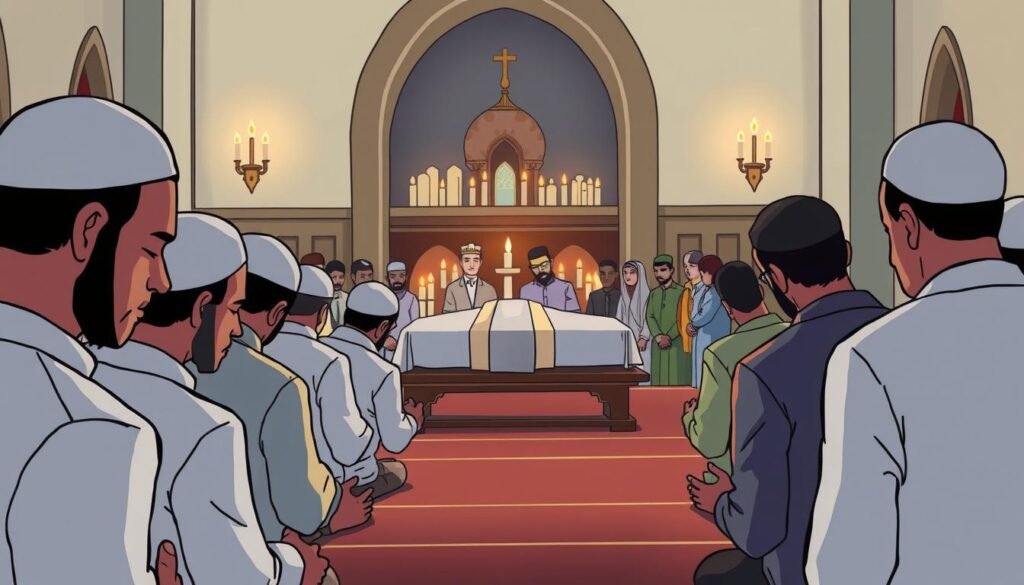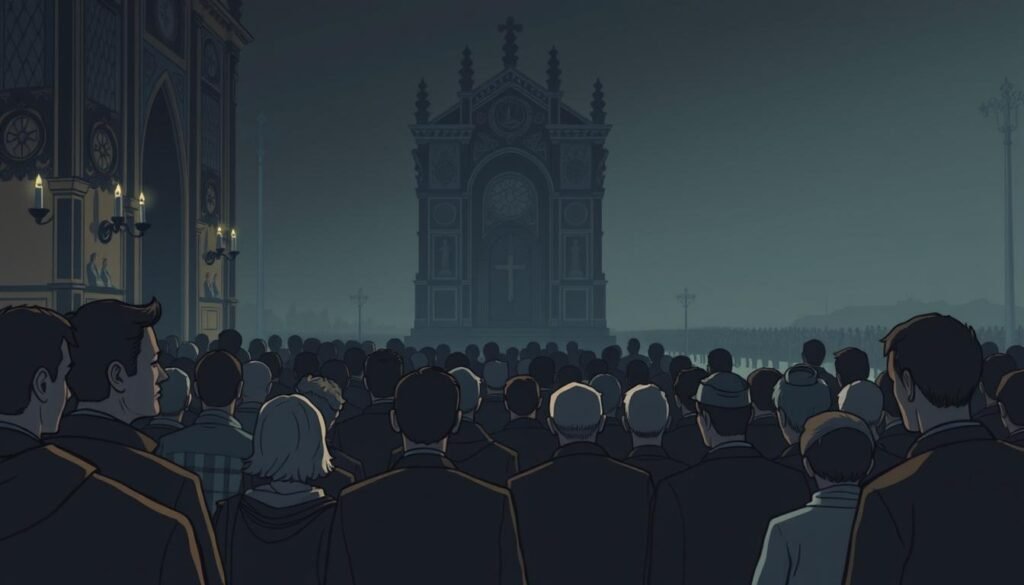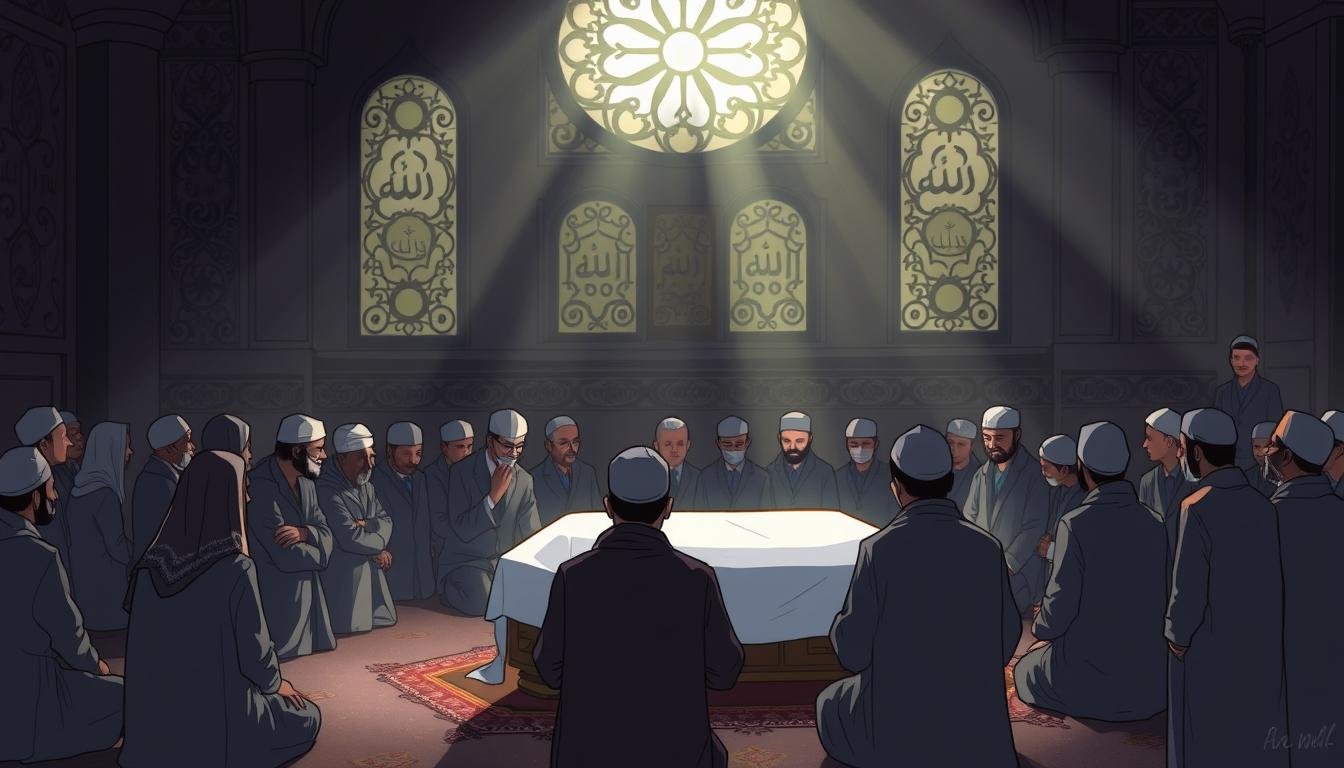Death is something we all share, no matter our faith. But, many wonder if they should attend a Muslim funeral. It’s not just about rules; it’s about showing respect and honoring a loved one.
Think about this: over 35% of Americans have friends from other faiths. When we’re all grieving, how do we show respect for Islamic traditions? The Quran teaches us to be kind to those who live peacefully with us (Surah al-Mumtahanah 60:8).
Islamic teachings guide us on kindness and respect. Non-Muslims might wonder how to join in without crossing any lines. The Prophet Muhammad showed us how to respect others while staying true to our faith.
Let’s look into islamic funeral etiquette and if non-Muslims can attend. It’s not just about rules; it’s about building connections and respecting beliefs. By the end, you’ll know the guidelines and the reasons behind them.
Understanding Muslim Funeral Traditions
Islamic funeral practices focus on humility and respect for life’s short time. We look at how these rituals show core beliefs. At MuslimCultureHub, we teach that death is a move to the afterlife. This idea guides every step of the process.
The Religious Significance of Muslim Funerals
Funerals are fard kifayah—a duty for the community. This means no family has to grieve alone. The quick burial, within 24 hours, shows respect and dignity.
Rituals like ghusl (washing) and kafan (shrouding) show equality before God. They remove earthly differences.
Key Components of Islamic Funeral Practices
Muslim burial customs include three main acts. The funeral prayer (salat al-janazah) lasts about 5 minutes. Graveside prayers and burial facing Mecca are also important.
The body is placed on its right side in a simple shroud. This is different from elaborate caskets. People may help put soil in the grave, showing humility.
Timeline of a Traditional Muslim Funeral
Speed is key from death to burial. The body is washed, shrouded, and prayed over quickly. The service is brief but full of meaning.
Rows form behind the coffin, and prayers are recited. Then, the burial happens. This shows life’s end is sacred, not sad.
Can Non-Muslim Attend Muslim Funeral? The Direct Answer
Islamic traditions welcome questions about participation. Yes, non-Muslims can attend most parts of a Muslim funeral. They can join gatherings at homes and services. But, rituals like the funeral prayer (salat al-janazah) are for Muslims only.
My experience shows that communities vary. Some warmly invite outsiders, while others prefer privacy. The main rule is to respect cultural and religious boundaries.
Attending a Muslim janazah means being mindful. Non-Muslims can watch prayers from afar but shouldn’t join. They should wear modest clothes, like long sleeves and head coverings for women.
In Sydney, Islamic Funerals bury without tombstones, showing Islamic simplicity. In the U.S., services are short, usually under an hour. They focus on communal support.
“Inclusivity starts with understanding,” says Dr. Amina Ahmed, an Islamic scholar. “Non-Muslims attending show solidarity, but must respect rituals like the washing (ghusl), performed only by same-gender family members.”
Attending a Muslim funeral needs sensitivity to timing. Services happen quickly, in 24 hours. So, planning ahead is key.
Non-Muslims can’t join prayers but their presence helps connect. If you have questions, ask the family. Local customs vary. This openness builds bridges, honoring both tradition and shared humanity.
Islamic Perspectives on Non-Muslim Funeral Attendance
Islamic views on funerals are rich and varied. They are shaped by scholars and cultural practices. The Salat al-Janazah is a key practice, but how non-Muslims are seen varies.
Scholars like the Hanafi school look at family ties to decide if non-Muslims can attend. This shows a balance between religious rules and human connections.

In South Asia and the Middle East, funerals are simple and modest. But, local customs decide if non-Muslims can join. For example, some Arab families focus on prayer, while others in Southeast Asia welcome all to honor humanity.
In the U.S., cities like Dearborn, Michigan, mix Islamic teachings with American ways. Some invite non-Muslims, following the Quran’s call for unity. But, in rural areas, some believe only Muslims should attend, citing Quran 9:113.
“The question isn’t merely about presence—it’s about intentions,” explains Dr. Aminah Beverly McCloud, a noted Islamic scholar. “When non-Muslims attend, it can strengthen communal bonds without violating religious boundaries.”
These differences help us understand each other better. They show the importance of respecting both divine teachings and human dignity. This respect is key to building harmony between different faiths.
What to Expect at a Muslim Funeral Service
A muslim funeral service is simple and solemn. It happens in a mosque, funeral home, or cemetery. It lasts 30 to 60 minutes.
People remove their shoes before entering. They wear modest clothes. Men wear long shirts and trousers. Women wear long-sleeved tops and skirts.
During the janazah prayer, people stand in rows. Men are at the front, children in the middle, and women at the back. The imam leads the prayer, then they go to the burial site.
After the prayer, the body is buried in a simple white cloth. It faces Mecca without a casket. People may throw soil into the grave as a tradition.
Crying loudly is not encouraged. Instead, people show respect. Non-Muslims can watch from afar but are welcome to offer condolences later.
“The universal language of respect transcends words,” shared by a community leader I interviewed, highlighting how shared silence and presence become gestures of solidarity.
The islamic funeral process values humility and unity. By following these customs, non-Muslims can show respect and honor the traditions.
Proper Etiquette for Non-Muslims at Islamic Funerals
Attending an Islamic funeral as a non-Muslim? Knowing muslim funeral etiquette is key. It shows respect and honors tradition. Here are some important guidelines to follow.
Dress Code Guidelines are all about modesty. Stick to the islamic funeral dress code by wearing long sleeves and pants that cover your knees. Women might want to bring a headscarf for mosques, but it depends on the place.
Choose simple colors like black, white, or neutral. Avoid bright or flashy clothes. Most Muslims expect guests to dress quietly, showing respect.
Behavioral Expectations are about being quiet and respectful. Follow the crowd when standing or sitting. Don’t make loud noises or show too much emotion.
Turn off your phone and don’t take pictures. Cameras and phones are usually not allowed. If you’re not sure what to do, just watch what others do.
Participation Boundaries tell you what you can do. As a non-muslim at janazah, don’t join in the prayers. Stand back during prayers and burial rites. Just being there is a kind gesture.
Most places welcome non-Muslims with open arms. They see your presence as a chance to connect. If you’re unsure, just be humble and watch. Your respectful presence helps bring people together, not apart.
Common Concerns of Non-Muslims Attending Islamic Funerals
Thinking about going to an Islamic funeral? You might wonder about cultural rules and personal space. The attending muslim funeral concerns often deal with showing respect for Islamic ways while staying true to your beliefs. For example, you might worry about not joining the funeral prayer, which is important for Muslims.
But here’s the thing: your presence as a non-muslim at islamic service is usually welcome. You don’t have to join in the prayers if you don’t want to.
“Respectful presence is more important than ritual participation,” says Dr. Amina Wadud, Islamic scholar, stressing that building bridges starts with good intentions.
Dress codes are another concern. Non-Muslim women don’t have to wear headscarves, but they should dress modestly. During prayers, men and women might sit separately. But, there are places where everyone can gather, like at graves or after the service.
The short length of the service—usually 30–60 minutes—can also be puzzling. Islamic funerals happen quickly, often in a day or two. Making sure you’re there on time is important, but it’s okay to ask about the schedule.
What to say when you offer condolences is another question. Instead of flowers, giving food or saying “May Allah have mercy on them” is more fitting. Not seeing public viewings or fancy graves might feel strange at first. But knowing why these things aren’t done can help you feel more comfortable.
By focusing on what we all share—like feeling sad, needing support, and showing respect—we can learn from each other during these times.
How to Show Respect While Maintaining Your Own Beliefs
Showing respect at an interfaith funeral starts with recognizing shared feelings. Grief is something we all feel, and it brings us together. At an Islamic service, you can honor traditions while staying true to yourself.
When expressing condolences to Muslims, keep it simple and genuine. Saying “May Allah accept your patience” or using the Arabic Inna lillahi wa inna ilayhi raji’un shows you care without pushing your beliefs. Stay away from actions that might upset the service, like touching in certain settings. Dress modestly, as most families prefer it.
A guide on Islamic funeral practices says 90% of families like neutral clothes. This shows respect is often about choosing wisely what we wear and do.
Finding Common Ground in Grief
Being there at a funeral means a lot, even if you don’t share the same beliefs. Islamic tradition says attending a funeral is very rewarding. Think about how you can show respect without losing yourself.
Helping with arrangements or sharing a meal can help bring people together. Sometimes, actions speak louder than words.
Appropriate Ways to Express Condolences
Respecting Islamic traditions means not making assumptions about their beliefs. Write heartfelt messages or bring food to the family’s home. Respecting islamic traditions also means not pushing your religious views too hard.
A simple handshake or nod is enough, as hugs might not be common. Let the family guide your actions.
Special Considerations for Close Friends and Family Members
When grief crosses religious lines, small gestures mean a lot. Your presence is important, whether you share the same faith or not. Islamic traditions highlight the importance of community support, but there are boundaries. Let me help you navigate this delicate balance with care.
Supporting a Muslim Friend in Mourning
Supporting a Muslim friend in grief begins with understanding their culture. During the first three days, offer practical help like delivering halal meals. This shows respect for their dietary laws. Always ask before attending visits, as some families value their privacy.
The Prophet Muhammad taught us to support the bereaved for a year. This means checking in weeks later, maybe with a text or small gift. For widows, who mourn for longer, discreet support is key.
“The most meaningful connections emerge when both sides approach these moments with generous hearts,”
Understanding Your Role as a Non-Muslim Guest
At an Islamic funeral, non-Muslims can participate in certain rituals. For example, placing earth in the grave is open to all. But, avoid prayer spaces meant for Muslims. Your presence shows unity without disrespecting beliefs.
In interfaith marriages, it’s important to clarify roles. You might help with logistics while Muslim relatives handle the religious aspects. Always follow the family’s lead to show you respect their culture.
Supporting at an interfaith funeral requires sensitivity. Families often say, “Your willingness to learn is more important than words.” For more information, visit this guide on Islamic practices. Remember, presence, patience, and humility can build bridges between hearts.
When Non-Muslims Should Consider Not Attending
Deciding to decline a muslim funeral invitation is hard. But sometimes it’s the right thing to do. Islamic teachings value community bonds. Yet, religious funeral boundaries are important for faith and culture.
If the family wants only Muslims to attend, listen to them. Also, think twice if past disagreements might ruin the event. It’s about respect and keeping things peaceful.
Respecting religious funeral boundaries isn’t about keeping people out. It’s about keeping the focus on the person who passed away and the community’s healing.
Think about what you can do. If following interfaith funeral protocol is hard, it’s okay to say no. This way, everyone stays respectful.
For women, wearing the right clothes is key. Not doing so might be seen as disrespect. You can also help by giving to a cause the person cared about or by writing a kind note.

Maybe going to the funeral could cause trouble. Ask yourself if you’re needed there. Sometimes, visiting the family later or helping with plans is better.
Islamic traditions value being true over being there. Choosing not to go can show you care deeply. It’s a choice that shows respect and understanding.
Navigating Interfaith Relationships During Times of Loss
Funerals test and change interfaith relationships. They turn grief into understanding. Honoring a life, like through the Janazah prayer, shows how different faiths can connect.
Building Bridges Through Respectful Participation
Going to a Muslim funeral shows respect and solidarity. It goes beyond just being there. Listening without judging is key, as shown in “Sharing the Well”.
Seeing rituals like Ghusl or Surah Yasin shows Islamic values. These moments teach us about humility and community.
Learning Opportunities in Cross-Cultural Experiences
Mourning together teaches empathy. Seeing the three-day mourning or a communal meal after burial helps us understand Islamic values. It also makes Muslims curious about other traditions.
Even small actions, like saying condolences in Arabic, can break stereotypes. These moments remind us of the Qur’an’s teachings on kindness and justice.
FAQ
Can non-Muslims attend a Muslim funeral?
What are the key components of Islamic funeral practices?
Why do Muslim funerals typically occur so quickly after death?
What should I wear to a Muslim funeral?
How should I behave during a Muslim funeral?
Are there aspects of the funeral that non-Muslims should not participate in?
What if I’m worried about offending someone at the funeral?
How can I express condolences appropriately?
What if I need to decline the invitation to a Muslim funeral?
How can attending a funeral strengthen interfaith relationships?

Embracing Faith, One Insight at a Time!
The teachings of the Quran have always guided my path. With a deep passion for Islamic knowledge, I strive to blend the wisdom of tradition with the relevance of today, making the timeless messages of Islam accessible and meaningful for everyone.
Muslim Culture Hub is my platform to share historical insights and thought-provoking articles, exploring both well-known and lesser-discussed aspects of Islamic culture and beliefs. My mission is to create an inclusive online space where everyone can learn, strengthen their faith, and connect with the profound message of Islam.
Join the journey!
May peace be upon you.








